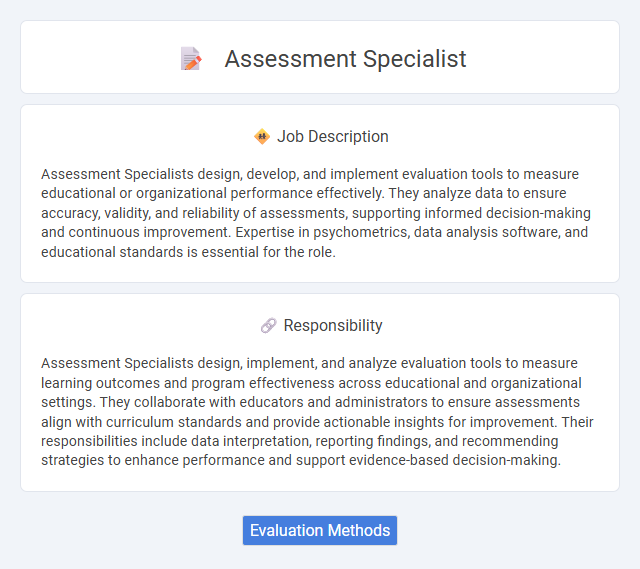
Assessment Specialists design, develop, and implement evaluation tools to measure educational or organizational performance effectively. They analyze data to ensure accuracy, validity, and reliability of assessments, supporting informed decision-making and continuous improvement. Expertise in psychometrics, data analysis software, and educational standards is essential for the role.
Individuals who possess strong analytical skills and a keen attention to detail are likely to be well-suited for the role of an Assessment Specialist. Those with a background in education, psychology, or data analysis might find the job aligns with their abilities and interests. People who thrive in structured environments and can maintain objectivity under pressure may have a higher probability of succeeding in this position.
Qualification
Assessment Specialists typically require a bachelor's degree in education, psychology, or a related field, with preferred certifications in testing and evaluation methodologies. Expertise in data analysis, psychometrics, and educational measurement tools enhances the ability to develop, administer, and interpret assessments accurately. Strong skills in communication and technology are essential for collaborating with educators and utilizing assessment software effectively.
Responsibility
Assessment Specialists design, implement, and analyze evaluation tools to measure learning outcomes and program effectiveness across educational and organizational settings. They collaborate with educators and administrators to ensure assessments align with curriculum standards and provide actionable insights for improvement. Their responsibilities include data interpretation, reporting findings, and recommending strategies to enhance performance and support evidence-based decision-making.
Benefit
An Assessment Specialist role likely offers the benefit of enhancing an organization's decision-making through precise data analysis and evaluation methods. There is a strong probability that professionals in this position gain expertise in research techniques, contributing to their career advancement and marketability. Moreover, the role may provide opportunities for collaboration across departments, fostering a diverse skill set and a comprehensive understanding of business needs.
Challenge
The role of an Assessment Specialist likely presents the challenge of designing and implementing effective evaluation methods that accurately measure learning outcomes and performance metrics. There is a strong probability that specialists must continuously adapt to evolving educational standards and diverse stakeholder needs. Balancing technical expertise with clear communication could also be a significant area requiring skillful management.
Career Advancement
Assessment Specialists play a crucial role in designing, implementing, and analyzing evaluation tools to measure educational or organizational performance. Mastery in data interpretation and familiarity with standardized testing methods open pathways to leadership positions such as Assessment Coordinator or Educational Program Manager. Continuous professional development in psychometrics, data analytics, and stakeholder communication enhances career advancement opportunities within educational institutions and corporate training departments.
Key Terms
Evaluation Methods
Assessment Specialists utilize a variety of evaluation methods including formative, summative, diagnostic, and benchmark assessments to measure student learning and program effectiveness. They design and implement data-driven tools such as rubrics, performance tasks, and standardized tests to provide accurate and actionable insights. Expertise in quantitative and qualitative analysis ensures assessments align with educational objectives and stakeholder needs.
 kuljobs.com
kuljobs.com